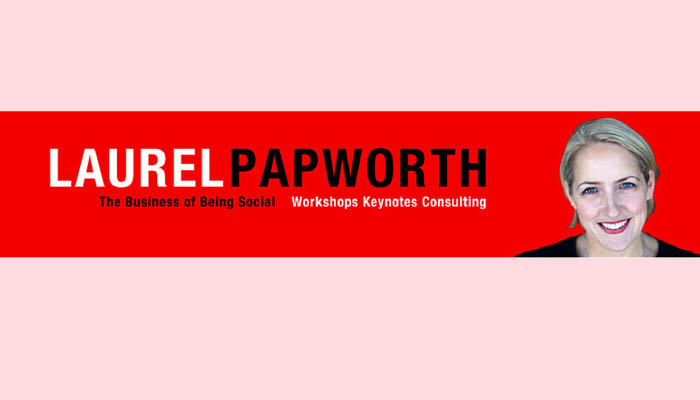The Top 6 Reasons why a business doesn’t need social media
and trust me I’ve heard them all – are:
- We know our customers, we don’t need to listen to them online
- I prefer to talk to my customers face to face
- We don’t need/have new customers (closed system)
- Customers just complain online
- Our customers aren’t online (oh really?)
- We prefer to advertise through TV and magazines
There are others but you get the gist. Each one has a counter argument but part of social media education is taking people on a journey so they come to that understandingthemselves through the workshop.
A Discussion on Social Media for a B2B consultant
Years ago, when I proposed running a “social media for your business” workshop or presentations the response used to be “who needs it, just wasting time online”. Today most of those responses have disappeared. However I recently gave a presentation on Facebook, Advertising and Big Data at a conference and an audience member was adamant he and his business didn’t need social media. He was a B2B (consultant to small business) and everything he does is word of mouth.
I asked him “do you have an email newsletter” he said no. Do you update your website? no. Do you communicate with your clients? Yep, face to face or on the phone. How do you vet your new clients? He wasn’t sure what I meant (I don’t accept all and any clients but I think he might’ve) and reiterated “word of mouth”. I suspect he might be the only consultant in his town in his field of expertise.
Which is fine until someone new and hungry comes to town.
A Competitor Comes to Town (case study)
So imagine this: Joe the Mechanic without a website or any online presence gets a lot of local business, doesn’t use a website or social media but has the obligatory listing in the yellow pages. But then Dave the Mechanic sets up shop opposite yet has no customers. The locals know Joe and don’t know Dave so every day Dave watches people stream into Joe’s garage.
Dave then decides to promote himself online. He does content marketing: top tips to save petrol usage, how to check the water thingie in the radiator thingie. I’m not a mechanic :p Dave answers quick questions on his Facebook Page – how to change a bulb for an indicator light. He offers a free something or the other if you come in for a checkup.
One day when Joe’s garage is full, a customer, Susan thinks to herself “I might try Dave, I’ve seen his stuff in my newsfeed”. Dave is punctual and courteous and gives out free coffee and Tim Tams. Maybe 2 Tim Tams!
Impact of SMO (Social Media Optimisation) on Google Search
Susan mentions to a friend, Sarah how great Dave is. Later on Sarah can’t remember Dave’s name so Google’s “garage, my town” and Dave’s name comes top (Google SEO likes social media activity particularly Google Plus Local Pages). Joe’s listing in the yellow pages is hidden behind a gateway link and Joes’ website is further down the search Page. Sarah goes to Dave.
The key here is that social media supports word of mouth. It doesn’t have to replace it but it allows anyone – a mechanic, a lawyer, an accountant, a florist – to stay in front of the customer. If Joe starts to copy Dave now, it looks bad. If you are looking at the ROI (return on investment) for a social media budget, check the COI (cost of inaction) – playing catchup is a losers game.
Look Deeper, Further for Engagement needs (Social Media)
I’ve had a few clients/students where I’ve had to investigate deeply the value of social media to their organisation as it wasn’t necessarily obvious straight away. One organisation had 5 clients and would never have more than those 5 (providing a Gov service to a small market of resellers). But always something comes out (dealing with crisis comms and negative criticism campaigns, emergency briefings, etc) if you look. If the organisation has marketing and PR/comms and customer service and recruitment and so on departments then those staff can add social media to their channels. Social Media is not necessarily about generating leads and marketing to new stakeholders but about continuing to build relationships and stay front of mind with existing stakeholders.
Source: Laurel Papworth




Leave A Comment